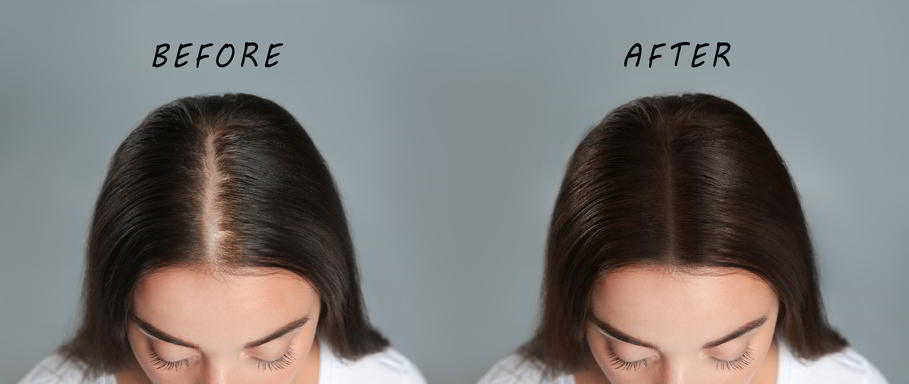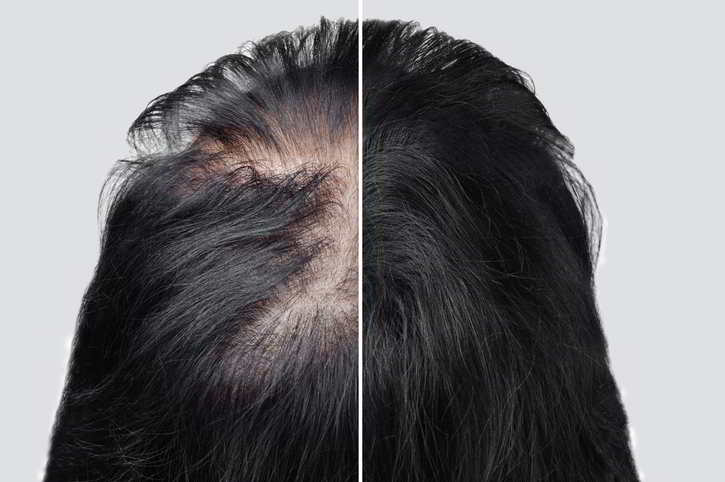Telogen Effluvium
The most common hair loss condition for men is Male Pattern Baldness (MPB). This condition can also be referred to as androgenic alopecia and genetic hair loss. This results in the gradual loss of hair, ultimately resulting in balding. The pattern of hair loss can typically be seen at the front of the head and the middle spreading towards the top area of the head.

What is Telogen Effluvium?
Telogen Effluvium takes place when sudden or severe stress causes an increase in the shedding of hair. A sudden or stressful event can trigger Telogen Effluvium causing certain hair follicles to prematurely stop growing and enter into the telogen (resting) phase. The hairs affected by Telogen Effluvium will then stay in the resting phase for about three months after which time they will shed. Often the person experiencing Telogen Effluvium will have recovered from the event before the hair loss occurs.
In most cases of Telogen Effluvium the hair loss is temporary and the hair soon recovers. However, in some cases of Telogen Effluvium the hair loss continues until the underlying cause is resolved with proper treatment.
What is Chronic Telogen Effluvium?
Chronic Telogen Effluvium, also known as Diffuse Hair Loss, is a prolonged hair loss condition that displays the same signs as regular Telogen Effluvium. The one main difference between these two is the length of time the condition lasts. Telogen Effluvium as stated is normally a temporary stage of hair loss and lasts up to six months, after which the hair usually grows back by itself. In the case of a patient suffering from Diffuse Hair Loss, patients suffer from a more severe form of this condition. The main signs of Chronic Telogen Effluvium are that it lasts longer than six months and the scalp show signs of hair thinning but no loss of follicles.
How Do I Know if My Hair Loss from Telogen Effluvium is Chronic or Not?
Whilst the length of time the condition lasts is the main difference between Telogen Effluvium and Diffuse Hair Loss, you will need to have a professional hair loss specialist assess your hair loss condition at our clinic to ensure you have an accurate diagnosis. This is extremely important with cases of Telogen Effluvium in both the regular and chronic form. This is because the underlying cause of this hair loss can be a side-effect of another health condition and must be treated in addition to the hair loss present. Examples of patients suffering from Telogen Effluvium can be seen in the pictures below. More information about Chronic Telogen Effluvium can be seen on the Chronic Telogen Effluvium page.
Who Does Telogen Effluvium Affect?
Telogen Effluvium affects more women than men because of precipitating events such as childbirth.
Some of the factors That Can Cause Telogen Effluvium are:
● Child birth
● Pregnancy Terminations
● Starting or Stopping Birth control pills
● Dieting Drug
● Therapy
● Severe Emotional Stress
Telogen Effluvium Resulting From Taking the Birth Control Pill
Birth control pills affect the hormone levels within the body and these hormone levels can affect hair growth. In some cases hair loss may occur due to the male hormones present in some types of contraceptive pills. This type of hair loss is similar to pattern baldness or androgenetic alopecia. However discontinuation of The Pill can result in Telogen Effluvium hair loss similar to that which occurs after child birth due to the drop in hormone levels
Drugs causing ongoing hair loss triggering chronic telogen effluvium
Some drugs have been reported to cause hair loss in some individuals. While not everyone will experience hair loss, some drugs are more likely to cause hair loss than others.
The following is a list of various drugs that have been reported to have side effects of hair loss:
● Alloppurinol (for the treatment of Gout)
● Heparin ( blood thinner)
● Coumarin (blood thinner)
● Clofibrate (Cholesterol lowering drug)
● Gemfibrozil (Cholesterol lowering drug)
The above drugs are only a few of the drugs that have been reported as contributing towards hair loss. If you suspect that prescription drugs that you are taking are causing hair loss you should discuss this with your doctor.
Medical Conditions That May Cause Ongoing Hair Loss
In some cases where diffuse and sudden hair loss occurs, if untreated, the hair loss may continue until the underlying cause is treated.
Types of sudden diffuse hair loss that continue until the cause is treated are as follows:
- Thyroid Gland Malfunction
- Diabetes
- Anaemia
- Systemic Lupus Erythematosis
Short-term telogen effluvium does not need to be treated as the hair will normally grow back on its own, but chronic telogen effluvium can be treated successfully in most cases.
It is important for us to not only concentrate on solving the underlying problem, but also in making sure that the hair loss is being prevented with treatment whilst also dealing with any underlying medical causes that triggered the chronic telogen effluvium. If you would like more information on the most effective ways of treating your condition.


Can Telogen Effluvium be treated?
Short-term telogen effluvium does not need to be treated as the hair will normally grow back on its own, but chronic telogen effluvium can be treated successfully in most cases.
It is important for us to not only concentrate on solving the underlying problem, but also in making sure that the hair loss is being prevented with treatment whilst also dealing with any underlying medical causes that triggered the chronic telogen effluvium. If you would like more information on the most effective ways of treating your condition.
Examples of Telogen Effluvium Hair Loss Treatment Success Stories:
The following examples show patients who have come to us for treatment for hair loss caused by Telogen Effluvium, and experienced a range of promising results.
Please note results may vary and are not guaranteed.
